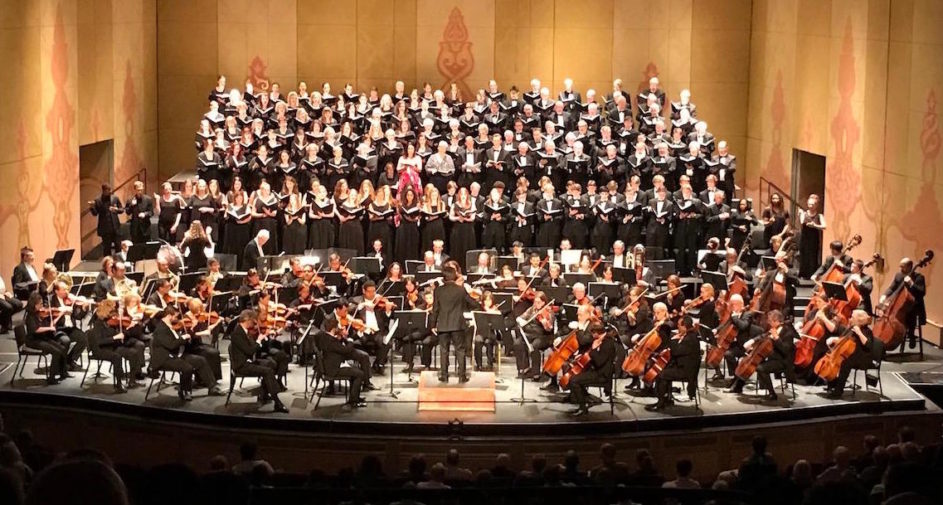The European world was changing in 1824. There were momentous events, many of which had begun years earlier. Napoleon Bonaparte, in whom Ludwig van Beethoven had placed such hopes for freedom from autocratic rule and to whom Beethoven initially dedicated his third symphony (but who had failed Beethoven’s dreams by plundering Europe and declaring himself emperor), died a British prisoner on the remote island of Saint Helena in 1821.
Beethoven had erased the dedication to Napoleon and changed the title to the “Sinfonia Eroica” (“Heroic Symphony”) before its completion in 1804. Its composition, nevertheless, had revolutionized what symphony music could be.
There was international outrage over the Ottomans’ massacre of Christians on the island of Chios in battles for Greek independence from 1821 to 1824. French painter Eugène Delacroix’s huge painting of “The Massacre at Chios” went on display in Paris, provoking the outpouring of more anger.
Germans, wanting freedom for themselves and sensing there might not be a quick achievement of it, began immigrating to Brazil in 1824, a trend that continued for more than 140 years.
But still, Beethoven had reason for optimism. The first of the composers who did not view himself as hired help who provided services for wealthy merchants and aristocrats, Beethoven went about his life as their equal. For the most part, he was treated that way.
When the London Philharmonic Society commissioned him to write a new symphony for them, the sense of optimism and triumph took over. He finally got the chance to fully use words of Friedrich Schiller’s poem “Ode to Joy” that had been rolling around in his head for decades.
The result was Beethoven’s Symphony No. 9 in D Minor, Op. 125, the “Choral Symphony,” the first symphony ever written using the human voice as one of the instruments in the orchestra. The fourth movement featured a large orchestra, a large chorus and four soloists. The vocalists sang the text of Schiller’s poem.
It has since become the world’s anthem. In Japan, it has become a beloved New Year tradition for thousands to assemble for performances of the “Ninth” and sing the fourth movement in massive choirs of 1,000 or more. It began with German prisoners who were taken to Japan as POWs in World War I. Their singing of the “Ode to Joy” caught on.
Last Thursday night at the Tennessee Theatre, the Knoxville Symphony Orchestra’s performance of Beethoven’s “Ninth,” with the fourth movement sung by the Knoxville Choral Society, Webb School of Knoxville Chamber Singers and soloists – soprano Kathryn Frady, mezzo-soprano Jan Wilson, tenor Andrew Skoog and bass Griffen Tracy – translated into sign language by teachers and students from the Tennessee School for the Deaf, was the best performance I have heard in many years.
Part of what made this performance was that it seemed to have six movements, the first two of which were written by different composers. The tone and sensibility of their music contributed to the feelings completed by Beethoven’s “Ninth.”
The first was American composer Jessie Montgomery’s “Banner,” written in 2014 as a tribute to the 200th anniversary of Francis Scott Key’s “Star Spangled Banner,” written in 1814. It was written as a rhapsody, with a string quartet playing the part of singers. In it, one can hear the quartet playing the same rhythms as the words “I pledge allegiance to the flag of the United States of America.”
There are, of course, moments that Beethoven never would have thought of writing but now appear regularly in new music: scratching of the string instrument bows on the strings, even foot stomping.
The second was Knoxville composer W. Mark Harrell’s “Time, Like an Ever Flowing Stream,” written as a KSO commission in 2009. The title comes from a verse in Isaac Watts’ 1708 “O God, Our Help in Ages Past,” a paraphrase of “Psalm 90.”
It began with an exquisite horn solo played by principal horn Jeffery Whaley. The horn serves as the individual considering the passing stream of life, an idea of which Beethoven certainly would have approved.
Information about the Knoxville Symphony’s upcoming April concerts can be found at the KSO website.

